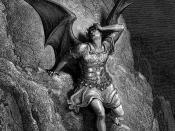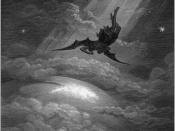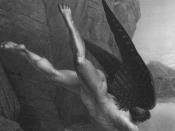At a young age, John Milton was convinced that he was destined for
greatness. He thought that he "might perhaps leave something so written to
aftertimes as they should not willingly let it die"(Text 414). For this
reason he thought that his life was very important to himself and to others.
He often wrote directly about himself, and he used his life experiences as
roots for his literature. In Paradise Lost and in a sonnet entitled "On
His Blindness," Milton speaks indirectly and directly of his loss of vision.
Also in Paradise Lost, he uses the political situation of his time as a
base for the plot, and he incorporates elements of his own character into
the character of Satan. In "On Having Arrived at the Age of Twenty-Three",
he speaks plainly about the course of his life.
In the latter part of his life, Milton lost his vision.
This loss was
very traumatic for him because he had not yet completed his mission of
writing a memorable work of literature. Soon after, he continued his work
with the help of his daughters. He dictated to them a sonnet he called "On
His Blindness" in which he asks how God expects him to do his work blind.
Milton's ambitious side says that his writing talent is "lodged with [him]
useless"(Text 417). His religious side soon realizes that he is
"complaining" to God and he takes it back. He discovers that God will not
look down on him if he does not write a masterpiece. He granted Milton a
great talent, and he expects Milton to be happy. He has to learn to do his
work in a dark world. This poem was not the last time Milton referred to
his condition in his writing. In book one of Paradise...


